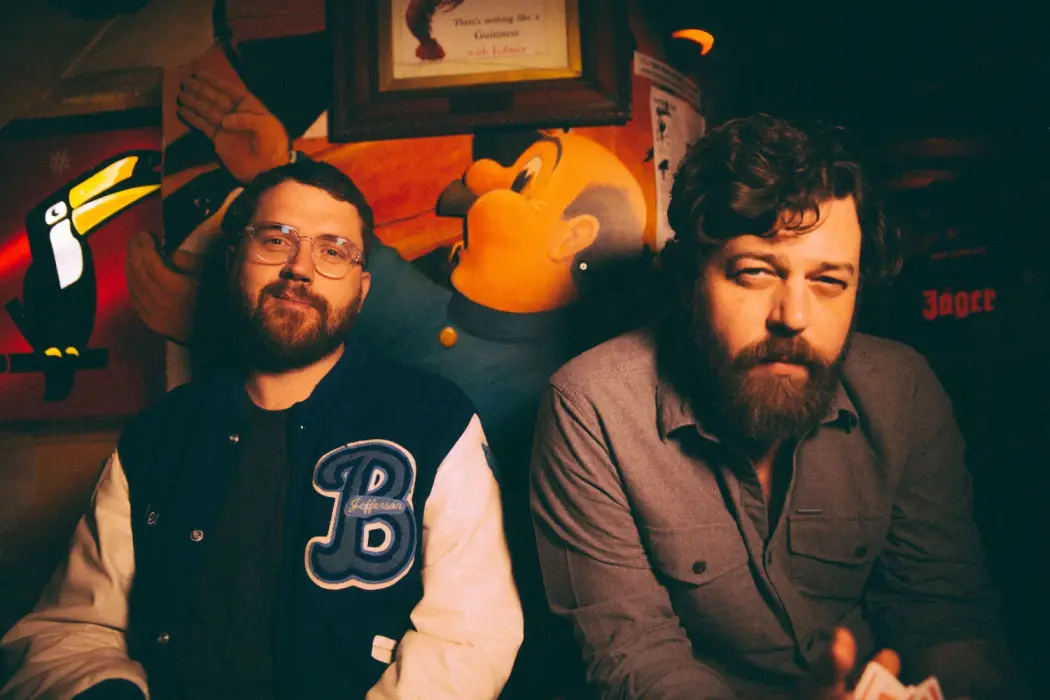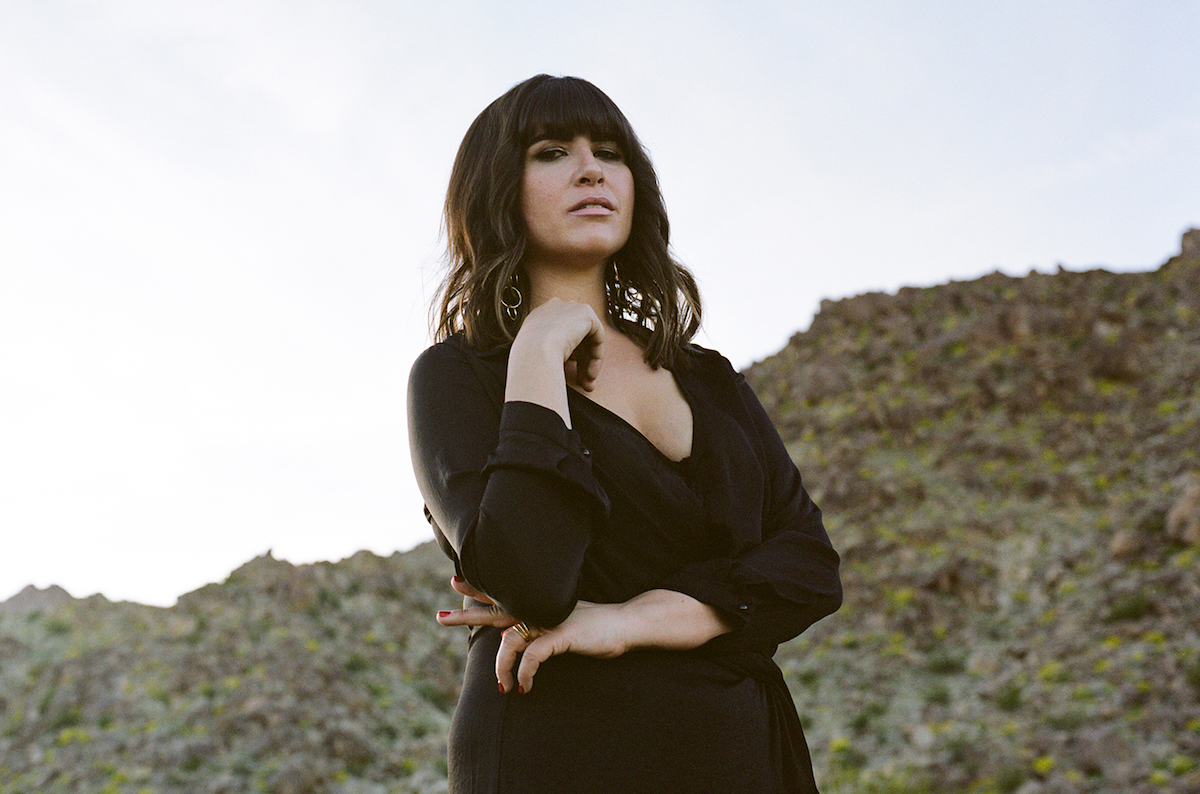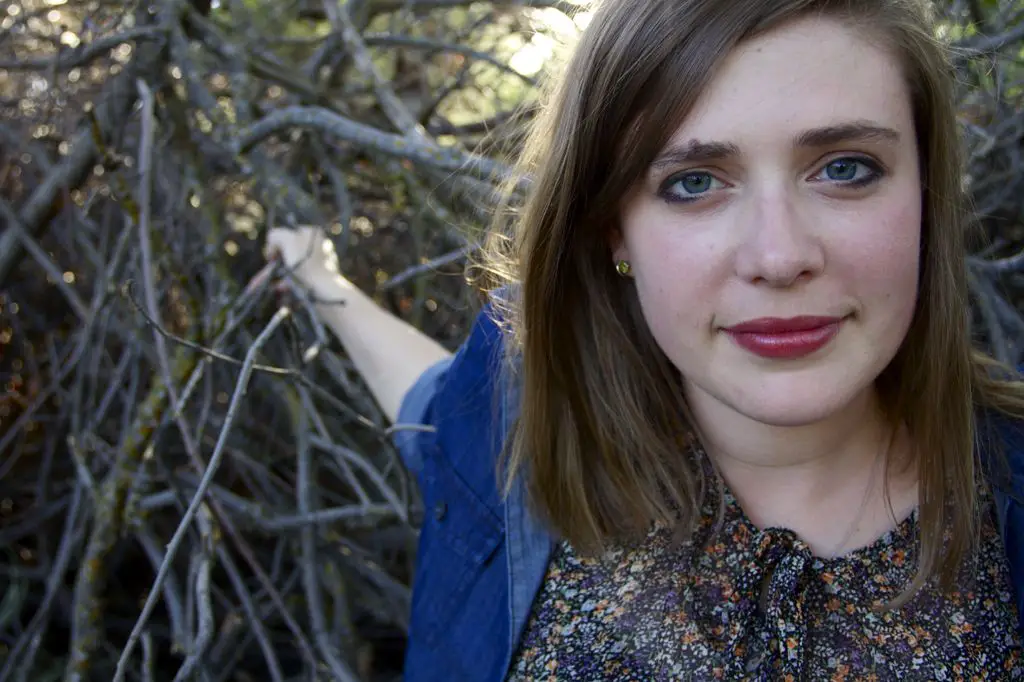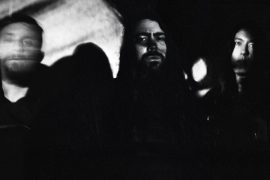Bear’s Den’s Andrew Davie opens up about the grief, pain, and growth surrounding the band’s stunning third album ‘So that you might hear me’, an ambitious, energizing, and emotionally nuanced triumph balancing darkness with light and raw vulnerability.
So that you might hear me – Bear’s Den
Bear’s Den’s third album opens with an intimate, heartfelt confession: “Out on Devoe and Humboldt, I escape myself / Been flying all night – a legend or a fool? Can’t I be both?” Andrew Davie asks, his soul adrift. “Well, I’m keeping it together, but you don’t know the half of it.” Davie’s somber, controlled reflection quickly escalates into a raw confrontation full of unresolved tensions and ragged humility. It’s a stunning entrance – one full of energy, as well as immense weight. Bear’s Den set a powerful scene with “Hiding Bottles,” capturing audience attention with an impassioned display of the vulnerable humanity that permeates their third full-length album.
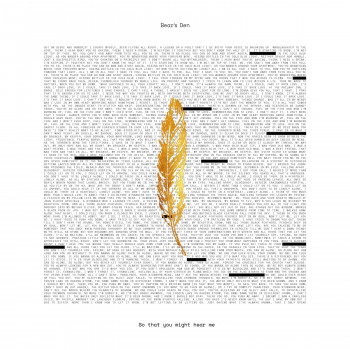
Thus begins So that you might hear me, Bear’s Den’s most ambitious and emotionally complex album to date. Released April 26 via Communion Records / Rounder Records, So that you might hear me is a musical study of strain, struggle, and hope. The British folk/rock-influenced band led by Andrew Davie and Kevin Jones have returned nearly three years after their highly lauded sophomore album Red Earth & Pouring Rain with a lighter, more nuanced perspective on things – taking on some of their heaviest subject matter to date with a glass-half-full, we-just-might-see-this-through attitude, despite the lingering feeling like all hope is lost.
“Fundamentally it’s a record that, on a lyrical and personal level, is still dealing with some difficult things, but at the same time – I think the point of writing music and writing songs is to bring that stuff into the light and talk about it,” Davie says.
Opener “Hiding Bottles,” for example, finds Davie attempting to connect with and help his mother with her alcoholism while reckoning with his own subsequent struggles with drinking.
Covering dark topics is nothing new for Bear’s Den, who have already dealt with illness, isolation, self-doubt, and death in their expressive work: Songs like “Agape” and “Above the Clouds of Pompeii” exemplify the band’s, and in particular Andrew Davie’s, emotionally stripped-down writing style. Back in 2016, Davie explained his tendency to use music as a “kind of therapy.” “I’m drawn to writing about things when I feel like I’m in a difficult place… Lyrically, I think it’s trying to figure stuff out, but also explore things that I don’t really understand.” Davie’s songwriting has long been as much of a journey for him as it is for Bear’s Den’s listeners, and with their new album, the London-based band have struck the perfect balance of inspired musicality and lyrical poetry.
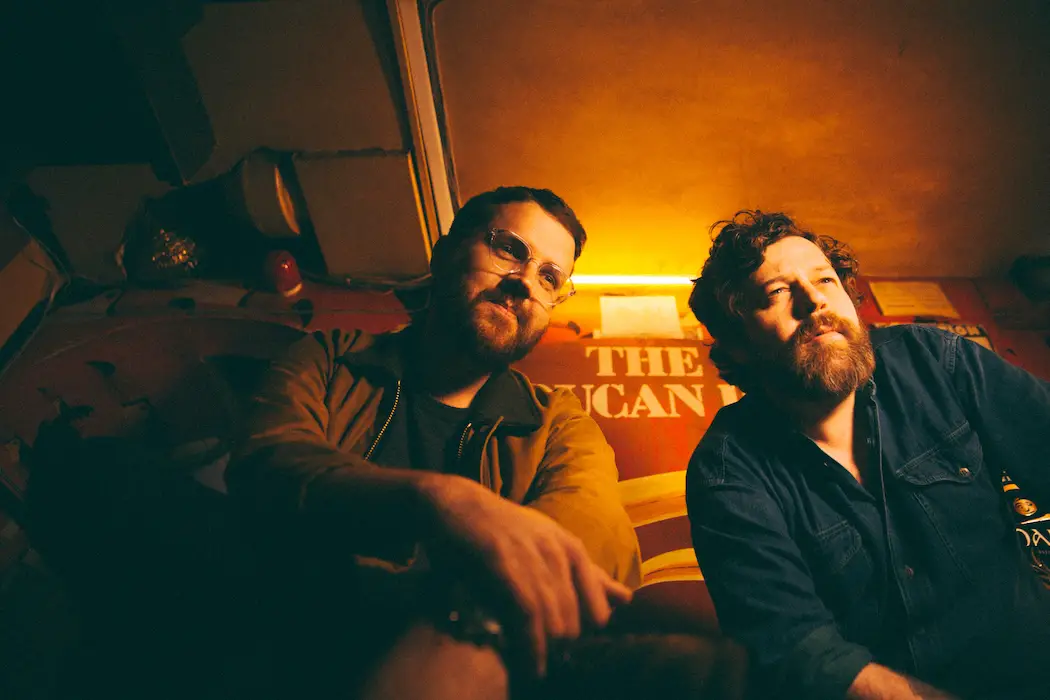
Whereas Red Earth & Pouring Rain was crafted in a rushed, busy three weeks, Bear’s Den took their time developing So that you might hear me over a number of months – renting out a studio to experiment and flesh out new material on a frequent basis. The result is a third album that affirms Bear’s Den’s longevity while capturing Davie and Jones in their natural state: In essence, this is Bear’s Den’s most “Bear’s Den” record.
This translates into a ruminative, introspective musical journey through the depths of a pain-stricken heart and soul. “One of the themes of the album is learning to be okay with things that aren’t okay. I think that’s one of the hardest things about life,” Davie muses.
I think I wanted to be able to write an album where I wasn’t afraid to talk about what was going on in there.
In spite of all the darkness surrounding it, So that you might hear me is truly a record full of warmth and light. The inspired message “You don’t have to be lonely alone” resonates throughout the song “Laurel Wreath,” where expressions of self-doubt and questioning one’s worth are met with calls for hope and possibility.
“A lot of people feel this sense that we’re becoming increasingly more isolated, despite being more and more connected, that kind of feeling,” Davie reflects. Often, Bear’s Den’s songs intended are as much a vessel of therapy and self-reflection, as they are a message for others going through the same issues:
Is it the withering of tired leaves
All so neatly woven round that laurel wreath
Or the collapsing of a history
Of victories getting lapped now
by all my towering defeats?
To be a champion in your eyes
Someone that you might
be proud to stand beside
But I bribed the judge
and poisoned the field
Medals and trophies
are only all that I could steal
– “Laurel Wreath,” Bear’s Den
Then there’s the stirring album centerpiece “Crow,” a heartbreakingly beautiful and honest diary-like exploration of Davie’s complex relationship with his late step-father:
My beautiful crow
And all those black feathers
perched deep in my soul
Won’t let me let you go
I never really thanked you for all the light
You brought into my mother’s eyes
So many others tried
Her sadness since the day you left
She will not get out of bed
She stares out the window,
smokes a black pack of JPS
Armed with such songs as “Crow,” “Hiding Bottles,” and more, Bear’s Den remind us of music’s immense power. These songs enable us to unpack a range of emotions, without pushing us to actually hurt or dwell in the pain. “That’s kind of the magic of music: You can talk about something very difficult and it can feel very hopeful,” Davie notes.
Opening with that attempt to reach Davie’s mother before it’s too late, So that you might hear me ultimately resolves with a message of acceptance. With the stirring lyric, “No I’m not sorry anymore,” “Blankets of Sorrow” offers a stirring conclusion to the record’s internal and external struggles. “When you’re trying to reach someone who can’t be reached or won’t hear you, it can drive you mad, or you can accept that and hope somewhere it changes, but at the same time, accept it and be okay with it,” Davie explains. “Learn to be okay with it… I think that’s often the case, that the darkest songs feel the most hopeful.”
So that you might hear me is a cathartic exercise in grief, compromise, and acceptance. There may not be any redemption, but there’s hope – and often times, that’s what people need most. Atwood Magazine spoke to Andrew Davie about the raw humanity at the heart of So that you might hear me, Bear’s Den’s sonic and lyrical maturity, Brexit, and more: Dive deep into this stunning album with our full interview below!
So that you might hear me is out now.
:: purchase Bear’s Den here ::
Stream: “Crow” – Bear’s Den
A CONVERSATION WITH BEAR’S DEN
Atwood Magazine: Hey, Davie. How are you?
Davie: I’m good, man. How are you doing?
Doing very well. I think it's been at least two or more years since last we spoke, and I loved that conversation. We basically talked about music as a form of therapy.
Davie: Yes, definitely, I remember it very well. It was a great conversation!
That was a fun one, so I want to pick up where we left off! When we spoke about your last album, we talked about how a lot of the intimacy in Bear’s Den’s music and lyrics came straight from you, and exploring relationships with friendship and family, life and loss, etc. How, if at all, has that changed for you in the past couple of years?
Davie: I think that’s still something I’m exploring a lot. With songwriting, I’m learning that’s the only way I know how to write stuff. Those themes are still massively important to me.
Looking back now, with the benefit of time, how has your relationship with Red Earth & Pouring Rain changed over the past couple of years?
Davie: Interesting. Yeah, I think that album, when we were making it, it was very intense and very in the moment. We’re both so proud of it. Lyrically, it’s something that I… it was a moment in time and I’m definitely really proud of it. Now, looking back on it, it’s like anything: When you get a bit older, you sometimes go, “Oh, I could’ve done that, should’ve written that instead, or whatever.” But I’m still really proud of that as a body of work.
For me, Red Earth & Pouring Rain was so... You used the word “intense,” and I think that's a very expressive word to use and for that record it fits. It was so very dark, I felt, and really had this kind of ambiance to it that sucked you in.
Davie: Yeah, definitely.
It was heavier than Islands, and it's heavier than some of your new music, as well. What has changed for Bear's Den over the past few years? Where did you find yourselves over the time when you were making the new album?
Davie: I guess, for us, one of the big changes was that we started renting a recording studio a couple years ago. That allowed us the opportunity to write whenever we wanted to, and record ideas and things like that. That really allowed us the opportunity to explore things, perhaps, in a bit more depth that we ever used to be able to, which I think was a pretty big difference for us.
Are you and Kevin still the two primary members of the group?
Davie: Yep, that’s right. Yeah. We are, but we’re very fortunate that we work with four incredible session musicians when we tour live. It’s really fun; it’s very collaborative between me and Kevin at the beginning stages, and then very collaborative with all of us as we make the album.
Having your own recording studio that you work in more frequently can completely change the way you make music. What was that like, making this recording and having so much more time to experiment and play?
Davie: I think for the first time, as a band, it allowed us the freedom to make mistakes and not worry so much about making them. I think that’s a big problem when you’re working in professional studios along with somebody else, and it’s quite expensive… You can end up in a situation where you’re worried about making mistakes and you just go for simpler ideas, and things like that, because you’re on the clock a little bit. So, it was nice to be able to try ideas out and just be me and Kev working there and figuring stuff out. A low pressure environment kind of thing.
I appreciate that. It really feels like you took your time with this one. I know that after Islands came out in 2014, Bear’s Den were really busy – between Kev's responsibilities with Communion Records, as well. There was a lot of touring, and then you went right back into the studio. It feels like, this time around, you took a little more time.
Davie: Definitely. I think it was less of a race, but it’s been in the past. Between the first album and the second album, we only really had three weeks to write that record. I think it helped us to have deadlines and stuff, but it was definitely nice to do it on our time, a little bit, and figure it out as and when we figured it out.
They say you have your entire life to write your first album, but you only have six months, or in this case, three weeks to write your follow up. But the third album has so much more freedom. And the third album gives you a chance to stand back and say, “Alright, what's happening? What are we doing?”
Davie: Absolutely. I also think it’s a real landmark for us to be able to even be thinking about making a third album, and to potentially be playing the kind of shows we’re playing to the kinds of audiences we’re fortunate enough to play to. I think, for us, it’s a moment to really go right with it… We’ve been touring and touring for so long and have made all these records, and now here’s a chance to really think, what kind of band do we want to be and what do we want to say? What’s our … what’s going on, a little bit. It’s definitely… it’s really interesting. With that comes responsibilities and freedoms; it’s an interesting marriage.
Let's dive into that. Who do you want to be? What do you want to say? What did you decide to say on this record? What do you feel its statement is?
Davie: I think that one of the fundamentals that keeps coming up on the album is this idea of trying to connect to someone and reach someone who is impossible to reach or can’t be reached. I think it stems from personal issues in my life but also, it was something that I just think I was just feeling myself at the time. I was feeling quite disconnected from people close to me and feeling a bit isolated.
So, in a sense, this is a record of connection - or of being the one who is disconnected, and it comes from both sides. It's reaching out, but it’s also on the other side of that and trying to reach in.
Davie: Absolutely. I think it’s something that I’ve felt toward others, but also something I think others have felt toward me. It’s a very personal album, but at the same time, I think it’s something that I can pick up on. And friends of mine… a lot of people feel this sense that we’re becoming increasingly more isolated, despite being more and more connected, that kind of feeling. And so, I think it’s kind of like a message for myself, as well as the people I was trying to talk to through that record. Weird one.
You open with “Hiding Bottles,” with the line, “No you can't run away from the cell you're in.” What is the significance of this song starting the album?
Davie: One of the issues I’ve been working on over the last couple of years in my personal life is that my mother is an alcoholic, and so I’ve been trying to help her for a long time and that’s been proving very, very difficult to reach her, and talk to her about that. In turn, it’s also led me to be drinking more than I would like to, and things like that – and so I think that came from a place of … Again, sort of an angry place of, “I want to be able to help somebody who isn’t willing to receive help,” and then also in turn, becoming that exact same kind of person yourself… Which I think is a very human and very weird phenomenon that we do: When we’re confronted with an issue, we sometimes take on the issue, as well. That song kind of started the album and is kind of the beginning. The opening of the book, I guess.
I feel like, with that, we flow so perfectly into “Fossils.” There's two things about “Fossils” that strike me so much: First of all, there's the intensity of it. It's such an intense song, and there's that big wall of sound that you create in the chorus that just really haunts me. On an album that is relativity lighter than your previous record, this song is definitively heavy. What was the intent behind introducing that weight, so early on in the album as a whole?
Davie: When we spoke about making the album, one thing we wanted to try and do a bit less of was the sort of steady ramp-up of a song, swelling and growing across a few minutes. We kind of wanted to make bolder jumps between choruses and things like that, and being a bit more, as you said, a “wall of sound” just coming in and cutting out quite quickly. It felt really exciting and fresh to us. With that song, I think it was a question of really getting a feeling of… it’s sort of, almost angry and not really knowing what to do next kind of a chorus, and that kind of, hell I don’t know “drop” into it. It felt like for that to really mean something, the music had to be as powerful as the lyrics. We really wanted to make sure we got that across and it felt almost jarring with the rest of the songs, so that was really fun to work on that.
At the railway inn, I broke
Bile enough for lifetimes I have choked
I can’t feel a thing
I haven’t seen the light for so long
I’m gonna give you all that I have
I pray that it’s enough for us to last
I miss the way you trusted me
With anything, with everything
Can we just go back?
– “Fossils,” Bear’s Den
On “Fossils,” the lyrics also, really struck me. “Haven't seen the light in oh so long,” and later on, “I'm gonna give you all that I have, I pray that it's enough for us to last.” There's this continued theme of connection and trying to feel that connection. What I appreciate about it is it's so vague. You have this way of saying exactly what you want to say in such a way that we know what you mean, without having any idea what you are really talking about.
Davie: [laughs] It’s honestly… I think I’m always just trying to write things that feel really honest. I think the more you try to say something honestly, the more universally recognizable it probably is, just by the virtue of the fact that you mean it. I think those moments often come from things you’ve actually said or things you’ve actually felt, exactly like that. I think if you can tap into that, then I think, as an audience member it feels really… it feels true because it is true. That’s a weird one; I think people sometimes worry about being too specific, or sometimes worry about being too vague, but I think either way it’s about, do you mean it? And if you mean it, then it will be specific, vague, but fundamentally true and therefore, hopefully people will be able to relate to it.
I think the more you try to say something honestly, the more universally recognizable it probably is, just by the virtue of the fact that you mean it.
As you get on, do you find that you want to say things more directly or more true to what you're feeling?
Davie: Yeah, I think that is true. I think on this record, I’m slightly aware of… Something I said to Kev while we were working was like, “It’s all very well being vulnerable and in touch with what you’re going through in your songs, but then if you’re not doing that in real life, then is it actually that good for you?” And I think I wanted to be able to write an album where I wasn’t afraid to talk about what was going on in there, and… I guess that ties in with the title. It’s like a hand reaching out, I guess, kind of thing… Again, it’s making that connection. I don’t want it to be too vague – so vague that it feels like it could be anyone, you know?
I get it. In terms of our past conversation and what I've read from other people and reading your biography, that “Bear's Den have a confession to make,” that you were haunted by the poem; I feel like you're painted as this tortured soul. Do you feel like a tortured soul?
Davie: I don’t think I feel like a tortured soul all the time! I think I’m just drawn to writing stuff when things aren’t… when I haven’t got things figured out. I’m drawn to writing songs when I want to figure stuff out. It’s this kind of therapy idea, of trying to use songwriting as a way of discovering stuff about yourself, and that’s really interesting to me. I’m not really good at writing happy songs! [laughs] I don’t think it’s one of those things where it’s a constant state. I think it just seems to be when I’m most creative is when I’m trying to figure something out. It’s when I pick up instruments and when I get excited about writing songs when I’ve got work to do, I guess.
So as long as life is giving you problems, you're gonna have a boat load to work with.
Davie: [laughs] Yes. Exactly.
It reminds me of UK band Aquilo. They were sort of given the moniker of the Sad Boys. Speaking to them, they’re quite chipper in person! But I guess it's not about being sad or happy, but rather figuring out life and recognizing that life is a whole spectrum. It's easy to live in the easy stuff. It's the hard stuff that needs to be explained and to be understood better.
Davie: Absolutely. I think people are often surprised when they meet people who write songs that seem really sad, and they’re actually just really… I always thought Elena from Daughter is a really great example! She writes the most heartbreakingly sad, beautiful songs in the world, and she’s just the sweetest, giggliest, funnest person, as well! It’s really surreal. People when they’re on their own and thinking about things are different when they’re around other people, as well. And they think about different things, and I think that’s part of it. Just perhaps, the more difficult things… I don’t know, I’m just drawn to them somewhere in life.
I can attest to that; I feel the same way. What I love about this album, So That You Might Hear Me, is its sense of balance. I feel like there are moments of light splattered across the darkness. I feel that way with songs like “Breaker / Keeper” and “Crow,” The word I want to use is beautiful. Especially with Crow's lyrics, “A beautiful crow, all those black feathers perched deep in my soul.” The crow, which is something that is often so dark, is made to feel light, like the bad guy is really the good guy.
Davie: I think that song’s a really interesting one for me. I’m really proud of that song. I was reading a book called “Grief Is the Thing with Feathers,” which is a sort of weird poem novel by Max Porter, and I would thoroughly recommend reading that. I actually read that book and immediately found out that they were turning it into a play, and I wanted to write some music for it. I started writing “Crow” just as a piece of music, and then I heard that they had music for the play, and so I was like, “Oh, okay.” And then I started writing some lyrics and writing in a similar way to the writer of that book, both kind of using my own life story. It’s a really fun song to play and I’m really proud of it. It’s nice to hear that it feels light, as well, like there is a lightness to it. That it doesn’t feel too heavy. That’s always a worry, I think.
It's a good contrast to Red Earth & Pouring Rain, which I think inundated - not that it didn't have its moments of lightness or acoustic - but So That You Might Hear Me brings us up and down and up and down in a really enchanting fashion. I feel like it makes us feel those feelings that you're experiencing, without pushing us to hurt.
Davie: Yeah, I know exactly what you mean. I think that’s really important. Fundamentally it’s a record that, on a lyrical and personal level, is still dealing with some difficult things, but at the same time – I think the point of writing music and writing songs is to bring that stuff into the light and talk about it. There’s got to be an element of catharsis to that. It’s the same with live music: That’s when all of these songs start to feel complete to us. When we’re performing, them they become this moment of catharsis for everyone in that room. Hopefully, that aim is that it feels like a cathartic relief when you listen to it, rather than something that is entrapping, or anything… [laughs] That would be a failing if it felt like that!
I think the point of writing music and writing songs is to bring that stuff into the light and talk about it.
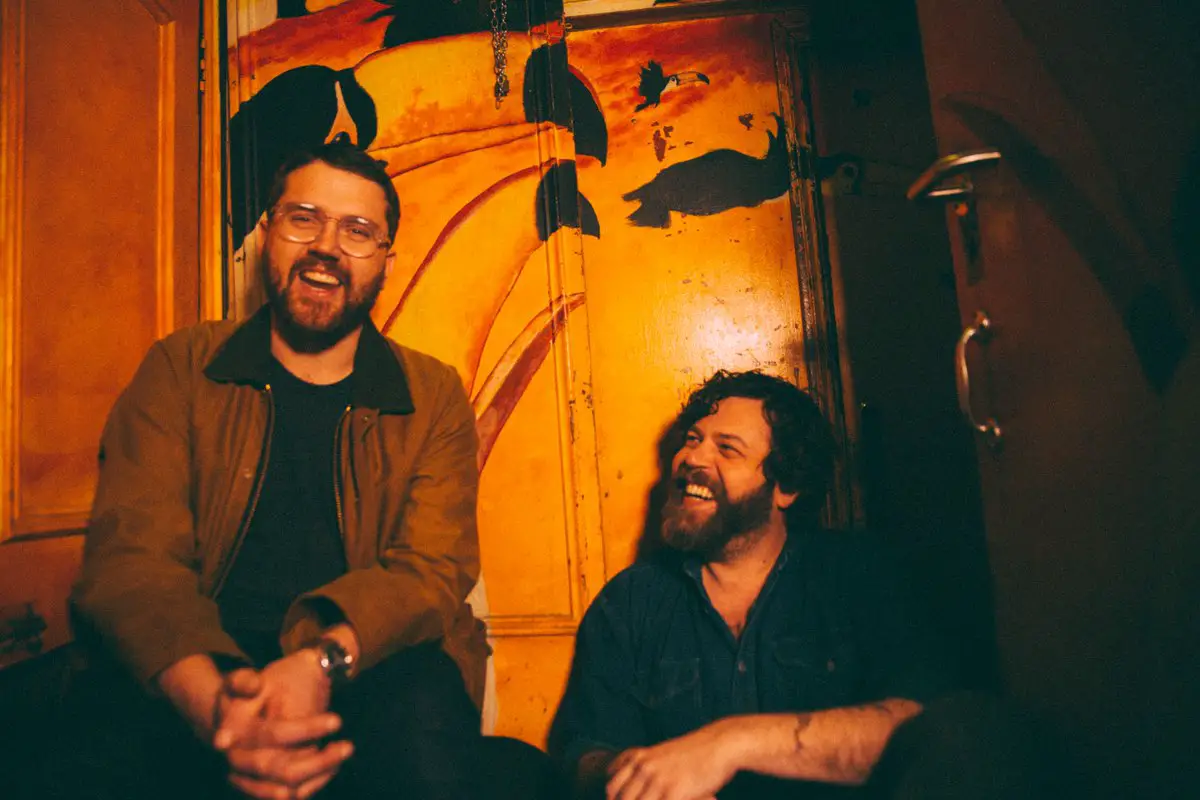
I appreciate that. You end with “Blankets of Sorrow.” That song really spoke to me; this lyric, “No I'm not sorry anymore,” that's haunted me since I heard it. As much as I want to be walked through it, I think what I'd rather hear from you is to discuss it: This song feels like the darkest song, but also the most hopeful song. How do you feel about that?
Davie: I think that’s pretty much the nail on the head, to be honest. I think it is. One of the themes of the album is learning to be okay with things that aren’t okay. I think that’s one of the hardest things about life – is going, “This is a really difficult thing and it may always be difficult, but I’m okay with that.” I can deal with it being difficult.
In that song, there is an element to it, to go back to the So That You Might Hear Me thing. When you’re trying to reach someone who can’t be reached or won’t hear you, it can drive you mad, or you can accept that and hope somewhere it changes, but at the same time, accept it and be okay with it. Learn to be okay with it. I think that song is that moment of going, “It may never change and I’ve got to learn to be okay with that.” I think that, in itself, there is hope for that. It’s a difficult one, but it’s also… I think that’s often the case, that the darkest songs feel the most hopeful.
One of my favorite songs is “I See A Darkness” by Bonnie ‘Prince’ Billy and some people are like, “Oh, that song is so depressing.” But I think it’s the most hopeful thing in the world. I almost hear it like it’s two friends at a bar, one of them just sort of saying that they’re going through something and trying to communicate it to his friend. It’s a really beautiful and effecting song. It sounds quite dark, but actually, there’s a lot of hope to it. The music is so hopeful. That’s kind of the magic of music: You can talk about something very difficult and it can feel very hopeful. It’s one of the best things about it.
I feel like Bear's Den are remaining very true to Bear's Den's sound. I don't know what that means, but while I sense an expansion in some ways, you’re also working with what you've worked with, and I like that.
Davie: I think we’re always open to trying different instruments, and incorporating them into what we’re doing, but I think fundamentally we still approach them the same way, which is always, how can we tell the best story musically and lyrically, with instruments? We definitely opened a few new doors on this record with electronic elements, a drum machine, and things like that. An acoustic guitar is one thing, but a synth part can be just as moving, or just as beautiful, or just as important to a song. And so I think, with everything, it’s just trying to make something that’s moving and something that feels right. And it’s very hard to pinpoint what makes something feel “right” over the next thing, but I guess that’s what Kev and I built over the years of working together: We’re both just learning more and more how to hit those marks, those invisible marks.
I can appreciate that. Davie, I still love and listen often to Islands. From “Agape” and “Above The Clouds Of Pompeii”… Do you feel you could have made So That You Might Hear Me’s songs back in 2013?
Davie: I don’t think so. To be honest, a big part of this album for me was trying to write differently to how I’ve been writing before. I’m worried slightly less about sounding really neat and tidy on a lyrical level, and I wanted to be able to almost make it sound more conversational at times and a bit less written. I would blurt things out and keep them intentionally ’cause I wanted discover, Why did I blurt that out? Why did I write that? It means something. Let’s figure it out. I think that probably comes from a sense of understanding and a subtle way of feeling a bit more confident in writing songs and feeling like I understand what I’m… I don’t know what the word is? Maybe, building confidence and feeling like I can take a few risks with songwriting that perhaps I wouldn’t have taken before. I think “Crow” is a song I’ve wanted to write for a long time. It came about in a really weird way, but I’m really glad that I’ve finally written that song, because that’s been a song I’ve wanted to write for a really long time.
That’s kind of the magic of music: You can talk about something very difficult and it can feel very hopeful.
Would “Crow” be one of your favorites on the record?
Davie: I think that’s probably my favorite at the moment. I mean, it changes. We’re about to go into rehearsals and stuff and I think as soon as we start playing things live… Often that changes everything, as well!
Obviously, music doesn't happen in a bubble. We talked about isolation on an individual level; there’s also isolation on a political level and on a country level, and you're living through Brexit, my friend. Whether it ever happens or not, the young will rule out eventually, I am sure of that, but until that time comes, we’ve just got to keep fighting. How does that experience, of what's going on in your backyard, affect you? How do you translate that into looking toward the future with Bear's Den, in terms of your own career and how Bear's Den identify with their British and their more global/international audience?
Davie: That’s a really good question. We’re a band fortunate enough to travel the world and work in loads of different places, and the ability to travel around in Europe has been completely eye-opening, overwhelmingly positive everywhere we’ve been – and in America, Canada, Australia, and hopefully we’ll get to more countries, but… I think it’s a very difficult one. I think it feels quite embarrassing, what’s going on politically in the UK at the moment. Again, it’s something that people who were feeling very disconnected politically have raised their voices. It’s a very difficult one to talk about, to be honest. It feels very surreal. We’ve just come back from doing some press in Europe and everyone’s asking us about Brexit. It just feels really hard to stand by the UK right now when it comes to Brexit, as it’s something we all completely disagree with. I think it’s ridiculous.
And they’re actually traveling around in Europe and taking advantage of being a part of Europe every day. And I think it’s sad, but I think you’re right — and I think your hope is the exact hope that everyone has, that the young will see it through. I don’t know if it’s even going to happen; I think it’s a real mess and I think people are slowly realizing that they were sold a vision that isn’t actually the truth. I think young people know what’s up, and I think exactly how you said it is exactly how I feel about it. I just know we’ll see it through, and I’m hopeful that it won’t actually happen, but maybe that’s wishful thinking.
With the album now upon us, are there any last minute things that you're so excited to share in advance of its release?
Davie: To be honest, I’m just so excited that it’s coming out! The reaction to the first couple songs has been insane, so we just can’t wait for people to hear it. It’s been a respokeal journey making it and we worked with Phil Ek in Seattle, and he was just amazing. It’s been a real incredible journey. Kev and I are so proud and can’t wait for people to hear it.
— — — —
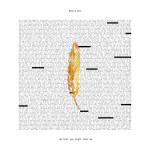
Connect with Bear’s Den on
Facebook, Twitter, Instagram
Discover more new music on Atwood Magazine
Bear's Den © Sequoia Ziff
So that you might hear me
an album by Bear’s Den

